
Almost exactly one year ago, a mysterious company aired a 30-second advertisement during Super Bowl LVII, pitching itself as an antidote to America’s inflation woes. In it, a woman scrolls and taps her phone as she dances in and out of the brand new outfits and accessories she has just added to her online cart. All the while, a catchy jingle plays:
“I like it. Yep, it’s mine.
Temu’s Super Bowl LVII commercial, which debuted in the U.S. on February 12, 2023. Credit: Superbowl Commercials via YouTube
The prices blow my mind.
I feel so rich.
I feel like a billionaire.”
Many Super Bowl viewers were left scratching their heads when the company behind this ode to rampant consumerism finally flashed on the screen with a swash of orange. Temu was, at the time, virtually unknown in the U.S., but the estimated $14 million, primetime campaign drew in so many new customers that Temu’s warehouses in China were soon overloaded.
Now, Temu is returning with a Super Bowl ad next month in a very different position. Not only has it taken off in the U.S. — becoming the most downloaded free app last year — it has also helped propel its Chinese sister company, Pinduoduo, to unprecedented heights. In December, the market value of PDD Holdings Inc., the parent company of Pinduoduo and Temu, reached $196 billion, dethroning Alibaba as the king of China’s massive and cut-throat e-commerce industry.

“I am truly startled. The underdog has almost become the leader of the pack,” an Alibaba staff member wrote on a company forum. The watershed moment even prompted Jack Ma, the co-founder of Alibaba, to break his silence. “I firmly believe that Alibaba will change and correct its course. All great companies are born in winter,” Ma wrote in response to the post.
A similar reflection took place at JD.com, the country’s second-largest e-commerce site before it was overtaken by Pinduoduo in 2019. “My mismanagement is to blame for many problems at the company. I am deeply remorseful. But no matter what, I will not lie flat,” founder and former CEO Richard Liu told his staff in an internal memo, Chinese outlet Latepost first reported.
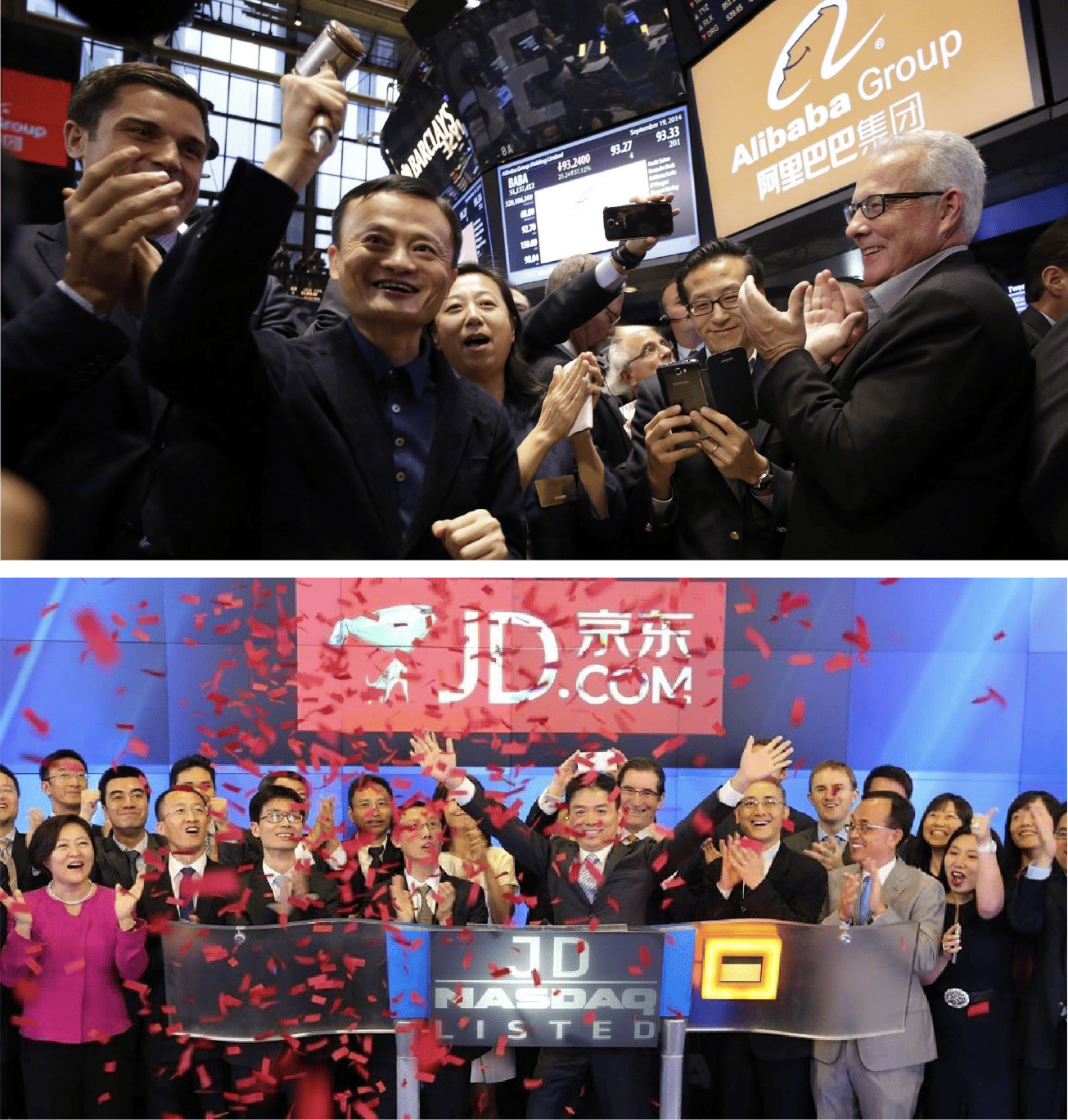
For a long time, Alibaba and JD.com hadn’t given much thought to the scrappy online retailer that once offered bargains like a bag of chips for one yuan. In 2015, when Pinduoduo first emerged, China’s e-commerce industry was saturated, and few analysts expected it to ever gain a foothold. As Ed Sander, a China tech analyst with Tech Buzz China, puts it, PDD and its founder Colin Huang “were much less flashy than Jack Ma and company.”
But while PDD’s swift ascent has caught many by surprise, it has long been Huang’s ambition to create “a different Alibaba.” “The formula for Alibaba’s success today may not be the formula for success tomorrow,” he said in 2016.
Instead of taking on Alibaba and JD.com directly, Pinduoduo turned to the untapped market of lower-tier cities and agricultural products. It pioneered a team-buying model, where users invite their friends and families to make purchases together and sellers lower prices in return for volume. When coupled with shifts in globalization and China’s larger economy, the strategy gave rise to a new era.
“PDD, Alibaba and JD.com are banking on different visions of the consumer market,” says Ivy Yang, founder of the New York-based consultancy Wavelet Strategy and a former communication executive at Alibaba. “For PDD, it was cheap, non-discretionary products and high frequency of repurchases. But for Alibaba and JD.com, it was a vision of consumption upgrade and the continued expansion of the Chinese middle class’s purchasing power. That vision was severely dented by the COVID pandemic and the economic reality that China is facing today.”
China’s crackdown on tech giants and push for common prosperity under Xi Jinping’s leadership also helped reorder the e-commerce landscape. Regulators slapped Alibaba with a record penalty of $2.8 billion in 2021 for preventing merchants from selling on other platforms. Last month, the titan was fined another $140 million after losing an anti-monopoly lawsuit to JD.com.
Pinduoduo, by contrast, has stayed in the good graces of Beijing by aligning its mission with state interests.
“They position themselves as a champion of the agricultural, small-scale producer and manufacturer that helps modernize a lot of the consumer economy in China that was left behind by the bigger tech and e-commerce companies,” says Sky Canaves, a senior analyst at the marketing research company Insider Intelligence. “It does put them in a better position in terms of how the government sees them.”
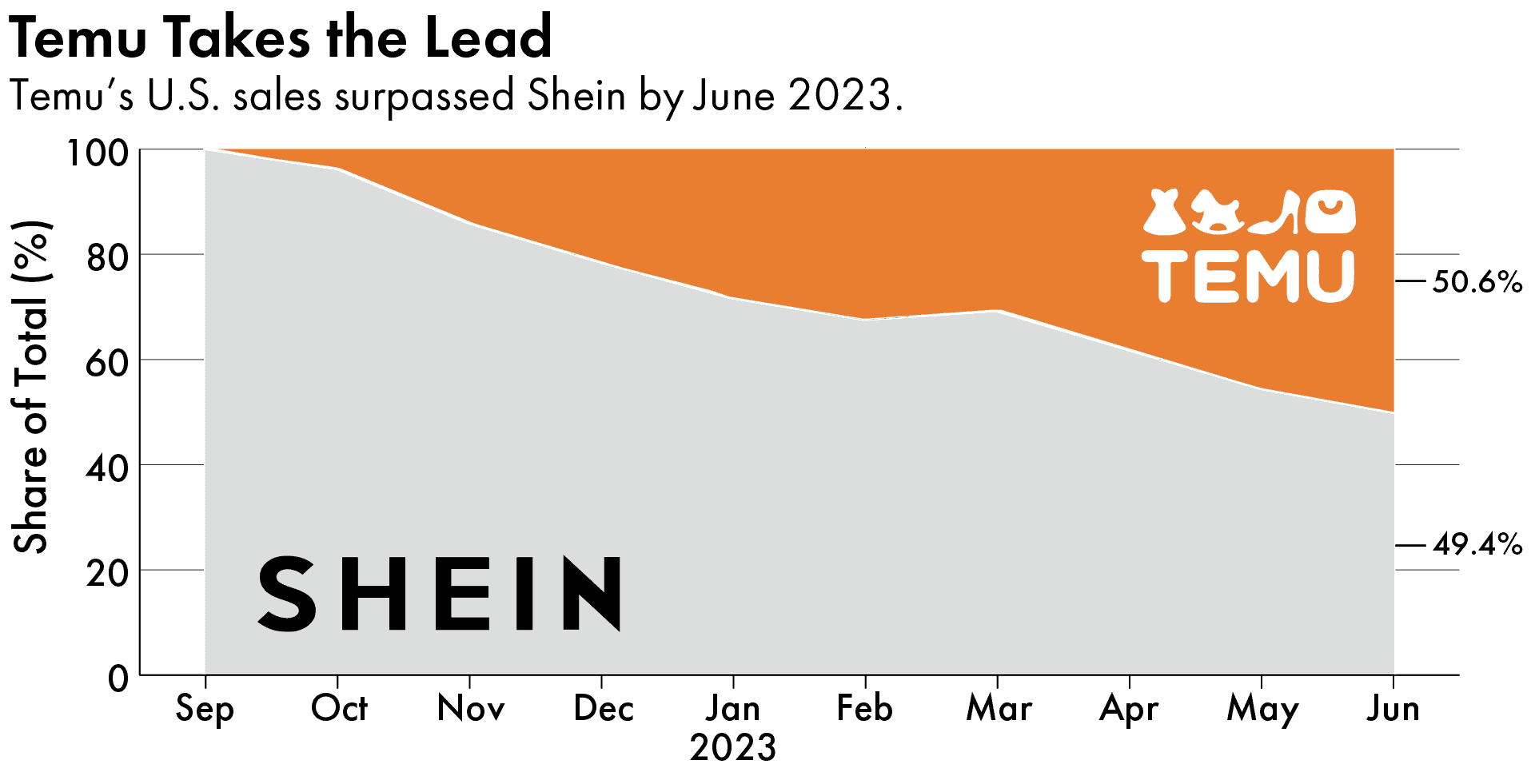
PDD also set itself apart by becoming a household name abroad — something Alibaba and others are still figuring out how to do. Temu burst onto the U.S. scene in September 2022 with heavy subsidies and aggressive marketing campaigns, winning over customers as a cheaper alternative to Amazon. It has also overtaken ultrafast fashion brand Shein in sales and eaten into the discount retail market long dominated by dollar-stores. Within a year, Temu has launched in 47 countries and topped download charts.
People want to believe that PDD has this massive potential — that it’s the next Alibaba. But there’s a lot of lingering questions that PDD hasn’t even begun to answer.
Ivy Yang, founder of the New York-based consultancy Wavelet Strategy and a former communication executive at Alibaba
Temu’s performance contributed to PDD’s 94 percent year-on-year jump in total revenues in the latest quarterly results. (Alibaba, in comparison, recorded 9 percent growth in the same period.) And the new king of Chinese e-commerce is just getting started. “Our business outside of China is still at an early stage,” co-CEO Chen Lei said in an earnings call in November. “Our mission is to serve all and benefit all and to empower consumers all around the world to live their best lives.”

Empowering the world to shop like a billionaire, however, comes with costs. In China, Pinduoduo was able to shrug off controversies over intellectual property protection, quality control and labor practices, but Temu will likely have to meet higher bars of due diligence in the West. Temu’s business practices have already drawn scrutiny from the U.S.-China Economic and Security Review Commission (USCC), for instance, and it could face further geopolitical headwinds as predecessors such as Shein and TikTok have shown. It is also only starting to feel the full pressure of going head-to-head with Amazon, the trillion dollar e-commerce goliath.
“People want to believe that PDD has this massive potential — that it’s the next Alibaba,” says Yang. “But there’s a lot of lingering questions that PDD hasn’t even begun to answer.”
CRACKING THE MARKET
From the very beginning, Colin Huang (Huang Zheng) has differentiated himself from Jack Ma. Although both men present as charmingly nerdy and hail from modest backgrounds in Hangzhou, Huang is more low-profile engineer than international businessman. When PDD went public on the Nasdaq stock exchange in July 2018, for instance, Huang took a decidedly different approach than Ma, who relished Alibaba’s 2014 celebration in New York. PDD was only three years old, and the company raised $1.6 billion that day, propelling Huang, who owned a 46.8 percent stake at the time, to the ranks of China’s wealthiest billionaires.
But instead of ringing the bell on Wall Street, Huang joined the ceremony remotely from Shanghai. “It’s just a ritual,” he told reporters. “It feels nicer to be with those who have helped us along the way.”
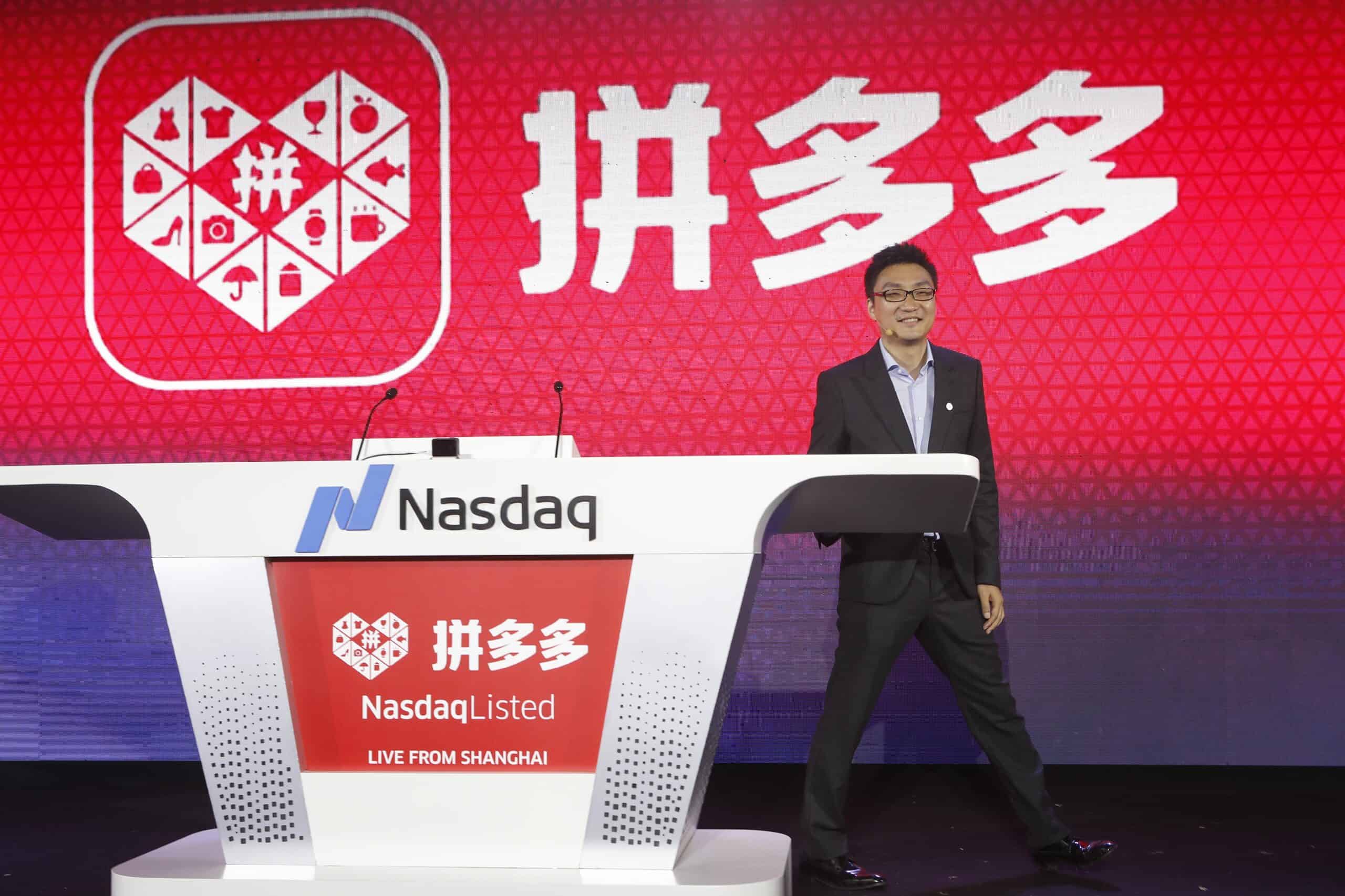
Huang received plenty of support as he built PDD — namely from Duan Yongping, the founder and chairman of China’s largest smartphone manufacturer BBK Electronics Corp., whose brands include Oppo and Vivo. Duan, who is well known for making early investments in Tencent and Zoom, met Huang in Silicon Valley in the early 2000s. Huang had moved to the U.S. for a master’s degree in computer science at the University of Wisconsin-Madison and stayed for an internship at Microsoft followed by a stint as a software engineer at Google.
Duan, who is 18 years Huang’s senior, was so kind to the young engineer that it prompted speculation that he had ‘adopted’ Huang as his godson. In 2006, for instance, when Duan placed a winning bid of $620,100 for lunch with Warren Buffett, he brought Huang along. A year later, as Huang quit Google China to go it alone, Duan served as his mentor and eventual financier.
After dabbling in a series of ventures, Huang founded Pinduoduo in 2015 with a handful of angel investors, including Duan, former Taobao CEO Sun Tongyu, Netease founder Ding Lei, and SF Express founder Wang Wei. It didn’t take long for the group to see returns; the company’s monthly gross merchandise value hit 1 billion yuan within a year of launch.

Experts attribute Pinduoduo’s stunning growth to a number of factors. For starters, its social e-commerce model — where users are incentivized to invite others to access more attractive prices — lowered customer acquisition costs and helped it gain a large customer base quickly. When Tencent joined as a major shareholder, in 2016, Pinduoduo also leveraged WeChat to reach out to new users. According to the company, its monthly active users leaped from 15 million in the first quarter of 2017 to 166 million the next year. (By 2022, that number was at 750 million.)
It also gamified the shopping experience to keep users engaged. Entertainment is such an integral aspect of the app that, in its prospectus, Huang described the future of Pinduoduo as a mix of Costco and Disneyland. Within the app, for example, users can water a plant regularly and when it matures, real fruit will be delivered to their door as a prize.
“Amazon is about how fast we can get you in-and-out of our platform and make it as streamlined and easy as possible,” says Ron Wardle, author of Innovation Factory: China’s Digital Playbook For Global Brands. “With the Chinese platforms, it’s more like, ‘how long can I keep you in my world?’”
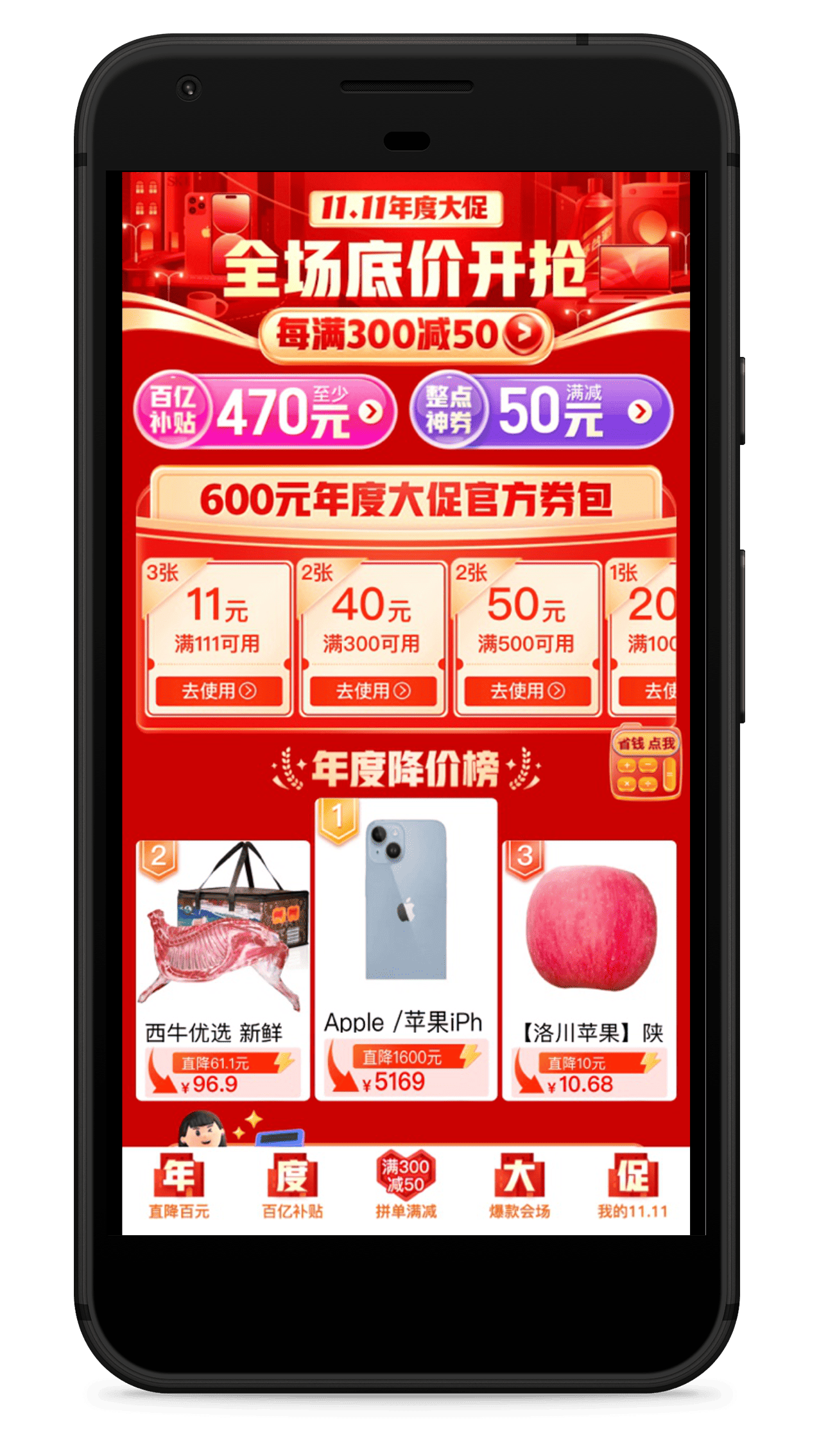
Still, most of Pinduoduo’s growth came down to one simple thing: the bargains it offered. Pinduoduo can offer such steep discounts because of its relatively unique business model, where buyers team up so they can purchase at wholesale prices. Additionally, most e-commerce sites make money by charging sellers a ‘take rate,’ essentially a commission on each sale. But Pinduoduo makes a large part of its revenues from add-on advertising services, making sellers pay in order to boost their exposure and traffic. For its first few years, Pinduoduo reinvested its profits into subsidizing merchants to further drive prices down.
“The fees for Alibaba can be anywhere between 5 percent to 10 percent, depending upon the category or platform that they own,” says Jacob Cooke, co-founder of the Asia-focused consultancy WPIC Marketing + Technologies. “Pinduoduo has tried to keep those transaction costs down to around the 0.5 percent mark, really undercutting anything that people can find.”
Huang stepped down as chief executive in 2020, when he was just 40 years old, and as chairman the following summer. Sander, at Tech Buzz China, notes that he has “always been amazed that [Huang and Pinduoduo] never got any serious fines during the 2021 tech rectification.” But while the company has managed to stay on the government’s good side, it has stirred controversies in China.
Many suppliers, for instance, have grown frustrated with some of its policies. Pinduoduo has a competitive bidding process for sellers, pressuring them to offer lower prices in return for traffic. But some sellers complained that they were repeatedly asked to further mark down products once they became popular, especially on Temu. Others bristled at the company’s generous refund policy, which upholds customers’ complaints without giving merchants the option to object and often issues returnless refunds. (Alibaba and JD.com recently implemented similar policies.)
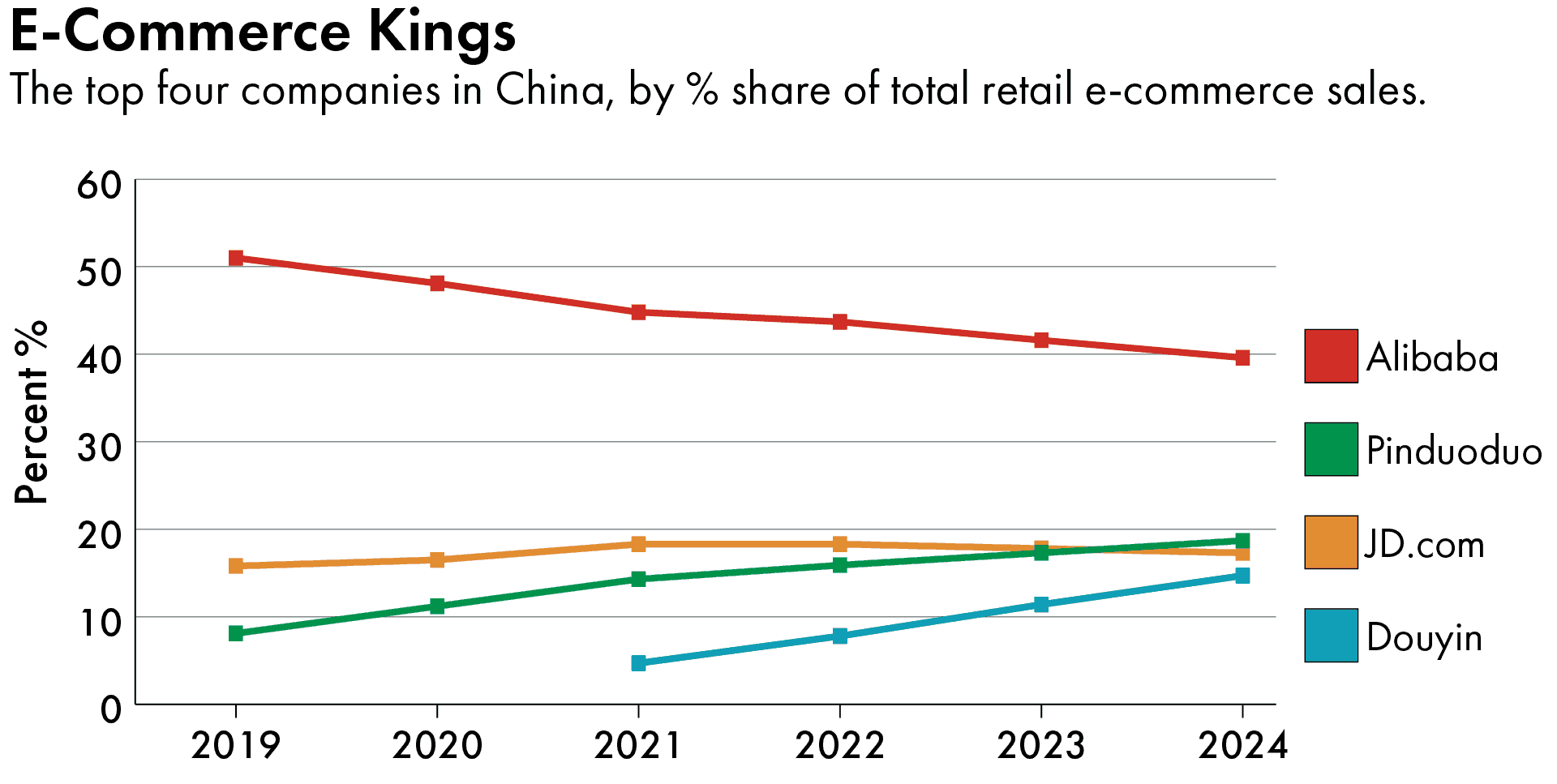
For Pinduoduo, these issues came to a head last year. Pushed over the brink, some disgruntled Chinese suppliers fought back by suing customers that demanded refunds, Rest of World reported. Others disrupted Pinduoduo’s operations by overwhelming top sellers with a wave of orders and cancellations last April, according to Chinese media.
“For PDD, the rule of thumb has always been to squeeze margins to the absolute extreme. But that is one of the biggest ticking bombs,” Yang says, noting that it could drive away small- and medium-sized suppliers and result in a less diverse supply chain. “If all your suppliers are these kinds of large players, then you have a very concentrated risk.”
Pinduoduo’s relentless focus on keeping costs down has also hurt its own employees. Analysts have credited its lean workforce — some 13,000 employees, compared to JD.com’s 540,000 — for its nimble operations and agile decision-making. But this was achieved partly thanks to its grueling hours, which stood out even within the ‘996’ hustle culture of China’s tech industry.
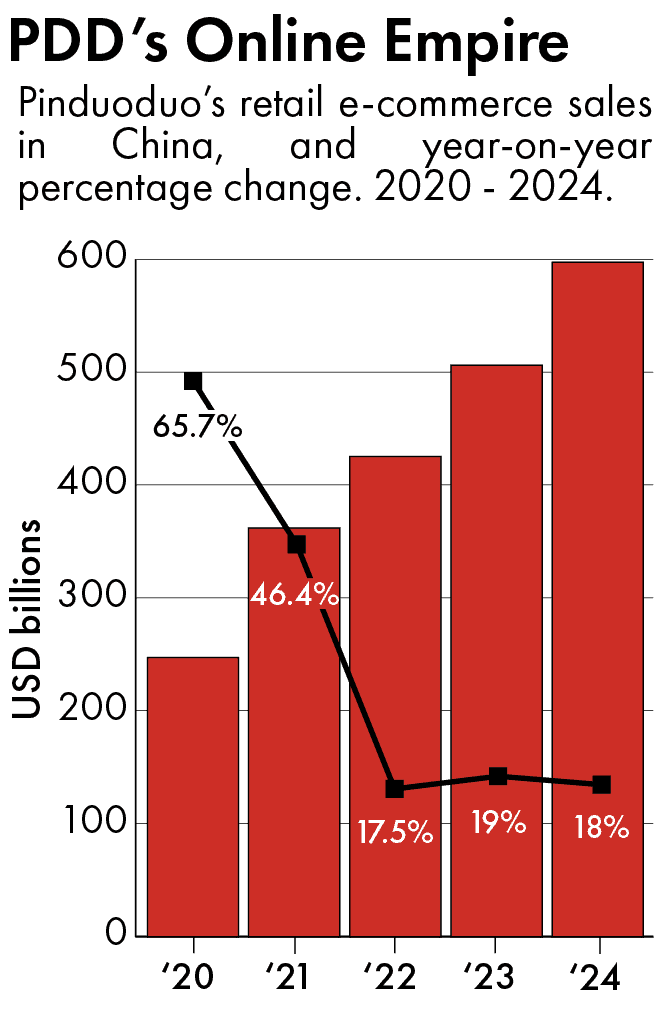
“It is very efficiency-driven. They do not care about anything else other than every single employee pulling their weight or even more to get whatever is done,” says Chen Weihan at Singapore-based research and consultancy firm Momentum Works. The company, Chen adds, also emphasizes compliance, commanding staff members to do as they are told and never question their bosses.
The mentality of doing whatever it takes has played out in other ways as well. Last March, Google suspended Pinduoduo’s app from the Play Store after finding malware in unsanctioned versions. Cybersecurity researchers said the app used spyware to steal information from other e-commerce apps and to gain access to users’ personal information. Oversecured, a mobile app security firm, said the intrusion was unprecedented.
“These exploits allowed Pinduoduo access to users’ locations, contacts, calendars, notifications, and photo albums without their consent,” it said. “They could also change system settings and access users’ social network accounts and chats.”
A Pinduoduo employee told CNN that the company had tasked a team of engineers and product managers with exploiting vulnerabilities in the Android system for profit. According to the report, the team was disbanded last March with many of its 100 members transferred to work on a different project — Temu.
THE SHEIN KILLER?
It’s not clear when or why PDD decided to expand abroad. Some reporting suggests it was always the plan, with PDD studying the U.S. market even before its public listing in 2018. Some analysts say it came from watching the success of Shein, especially as Chinese consumer spending slowed.
Whatever the reason, in 2022, PDD set up an office in Shenzhen right across from that of Shein and reportedly poached a number of its employees to jumpstart Temu. Like Shein, Temu offers wholesale prices by connecting foreign customers directly with Chinese manufacturers.
“The sellers or manufacturers only have to get the products to a Temu warehouse in China within a time limit. And then Temu manages the rest of the process from the warehousing to the domestic shipping to the port and then the international shipping and getting it to customers,” Canaves says.
But while Shein took off in 2020 on the back of social media advertising and influencers, Temu approached the U.S. market from all angles.
“Temu went all-in on globalization, not holding anything back,” says Yiru Qian, a Beijing-based senior analyst at the investment research firm EqualOcean.

The Super Bowl ads are but one example of its commitment, as is a November report from Goldman Sachs that estimated that the company is incurring a $11 loss per order and won’t reach profitability until 2025. (A Temu spokesperson told The Wire China that suggestions of significant losses for the company are “far from reality,” but did not provide any specifics.)
Pinduoduo’s success back home, analysts note, gave Temu the ability to prioritize market penetration and expansion over profitability.
“They have such an advantage with having a cash machine in their back pocket that it makes it very easy for them to operate strategically,” says Jeffrey Towson, a tech analyst and consultant that focuses on China.
The aggressive approach worked: Temu’s U.S. sales were double Shein’s last September, according to data from Bloomberg Second Measure. And Temu’s monthly average users around the world is catching up with Shein, even though the latter operates in more than 200 countries.
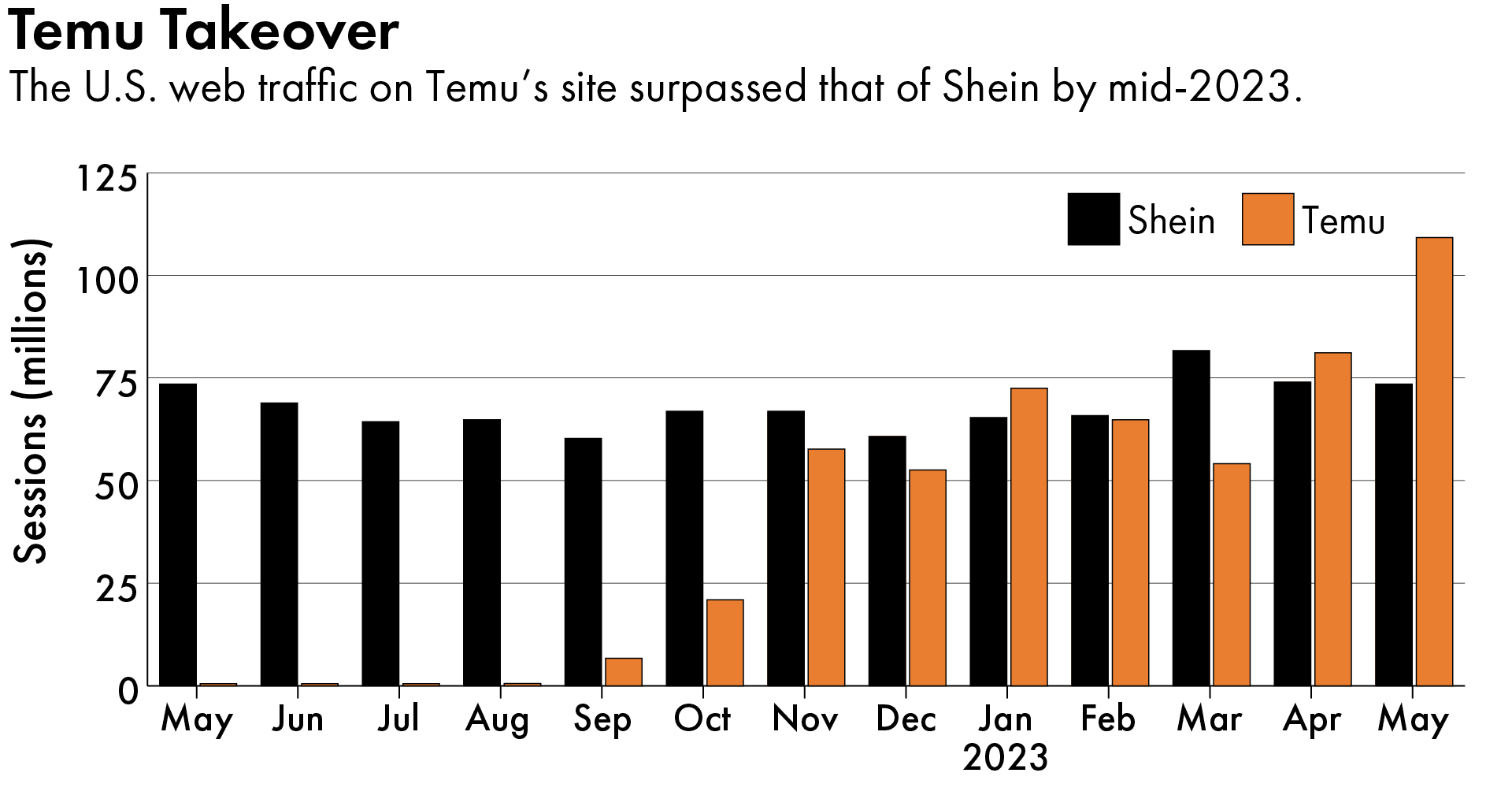
To catch up, the fast-fashion retailer is now eyeing a cash infusion with an initial public offering in the United States. But it faces obstacles both in China, where regulators are looking into how Shein handles data, according to the Wall Street Journal, as well as in the U.S., where Temu just sued the company, accusing it of “mafia-style tactics.” (Both Shein and Temu have sued each other in U.S. courts, but called a temporary truce in October.)
“They began to illegally detain merchants, forcibly asking for their phones, stealing our merchant accounts and passwords, stealing our business secrets, and simultaneously forcing merchants to leave our platform,” a Temu spokesperson told The Wire. “We had no choice but to sue them.”
Shein did not respond to a request for comment.
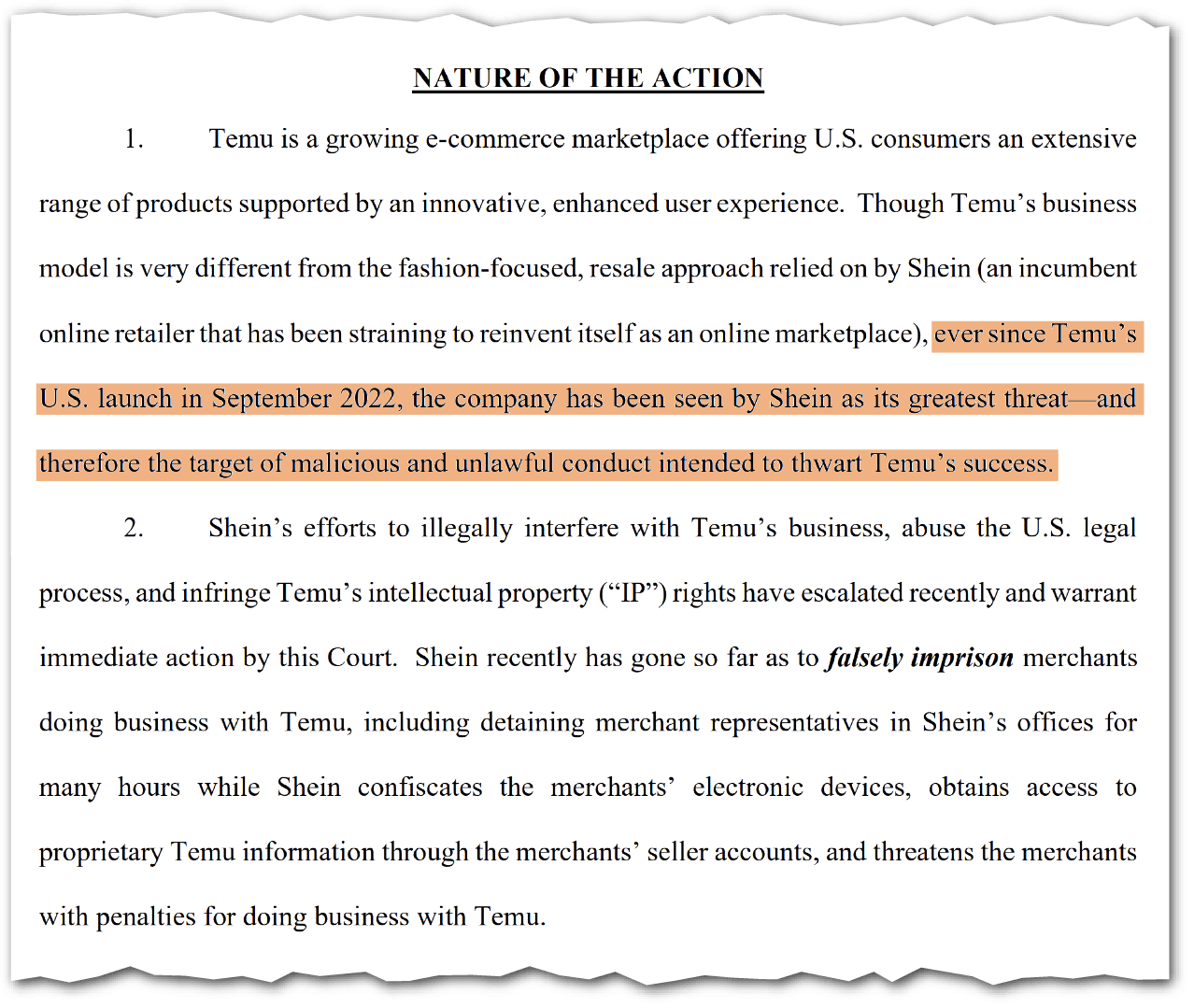
With Shein on its knees, some say Temu will be eyeing larger targets. Although Temu still has a long way to go to catch up with a legacy retailer like Amazon — which is supported by a far more powerful logistics network, has a wider selection of products (including name brands), and pursues a different subset of customers — analysts say it is injecting some healthy competition into what can be a complacent industry.
“The same [Chinese] factories can offer the same product on Temu for half the price,” says Sander, at Tech Buzz China. “Once people find out that it’s the same thing, that could really hurt Amazon.”
Amazon may already be feeling the heat: Last month, it slashed its commission rate for apparel items under $20 from 17 to 5 percent. And in a recent earnings call, Amazon stressed the pressure to lower costs. “From a customer behavior standpoint, we still see customers remaining cautious about price, trading down where they can and seeking out deals, coupled with lower spending on discretionary items,” said Brian Olsavsky, senior vice president and chief financial officer. (Amazon declined to comment for this story.)

U.S. shoppers may soon have more places to look for deals. Like Shein before it, the exponential growth of Temu seems to be ushering in more Chinese competitors — all vying for the international market. In September, for instance, TikTok debuted its e-commerce platform, TikTok Shop, tapping its 150 million user base in the U.S. to “turn discoverability into purchases.” (TikTok’s Chinese version, Douyin, has offered e-commerce since 2019.) And Alibaba, which previously faltered with its overseas experiments Lazada and AliExpress, appears to be pivoting, eager to try again. After reorganizing itself over the past year, Towson notes that “the international business of Alibaba is, as far as I can tell, one of the first business units that has really put the pedal to the metal.”
For Temu, at least, the ultimate threat to its ascension may come from within, not from its competitors.
For starters, it remains to be seen how Temu’s quest for lower prices affects product quality in a more discerning market. Temu’s customer retention rate is around 25 to 30 percent, according to Goldman Sachs. Amazon Prime’s, by contrast, is 93 percent. Some analysts warn that to truly thrive, the company needs to diversify, moving beyond bargain-basement goods to include higher-quality products, but its reputation and image for “cheap goods” might be difficult to change.
“While it propelled PDD to initial success,” says Sharon Gai, author of E-commerce Reimagined and former head of global key accounts at Alibaba, “it could prove a formidable barrier to establishing a premium brand, particularly in international markets like the U.S.”
Eventually, if [Temu] makes too much noise and market share, the government will be under pressure to actually update the regulations… Their business model is on thin ice.
Ron Wardle, author of Innovation Factory: China’s Digital Playbook For Global Brands
Moreover, while Colin Huang’s style may have been low-profile, Temu’s is certainly not. PDD has played down its Chinese roots by relocating its headquarters to Ireland last May, and Temu is based in Boston. But as the company becomes more omnipresent in American society — to include the hallowed Super Bowl ads — it is attracting more attention.
“In the short term, Temu has been this incredible overseas growth story for PDD,” says Yang, at Wavelet Strategy. “But Temu will eventually become PDD’s biggest reputational risk because of all of these issues: intellectual property rights, product quality issues, U.S. regulatory issues, and due diligence compliance issues.”
The USCC report in April noted that “Temu’s success raises flags about its business practices.” In the report, policy analyst Nicholas Kaufman pointed out that Chinese e-commerce companies like Temu and Shein are exploiting the de minimis provision — whereby low-value packages worth less than $800 are not subject to customs scrutiny and import duties — and noted that the company was “outmaneuvering regulators to grow a dominant U.S. market presence.”
According to the House Select Committee on the Chinese Communist Party, Temu and Shein alone account for 30 percent of all packages being shipped to the U.S. under the de minimis exemption. Since there is no way to ensure the companies are in compliance with the Uyghur Forced Labor Prevention Act (UFLPA), the Select Committee said, “This all but guarantees that shipments from Temu containing products made with forced labor are entering the United States on a regular basis, in violation of the UFLPA.”
Although most analysts say it is unlikely the de minimis policy will change anytime soon (doing so would wreak havoc on U.S. Customs and Border Protection), the U.S. government could still upend the whole Shein/Temu model. The Chinese firms were set up to facilitate person-to-person transactions, after all, which means they currently skirt a lot of laws and taxes.
“Eventually, if [Temu] makes too much noise and market share, the government will be under pressure to actually update the regulations,” Wardle says. “There’s a lot of consumer protection that needs to happen, and the loopholes will eventually get closed. Their business model is on thin ice.”
Closing those loopholes won’t necessarily sink Temu, Wardle notes. It will simply cut into Temu’s profit margins, making it a lot harder for the company to feel like a billionaire.

Rachel Cheung is a staff writer for The Wire China based in Hong Kong. She previously worked at VICE World News and South China Morning Post, where she won a SOPA Award for Excellence in Arts and Culture Reporting. Her work has appeared in The Washington Post, Los Angeles Times, Columbia Journalism Review and The Atlantic, among other outlets.




